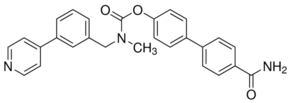All AbMole products are for research use only, cannot be used for human consumption.

For this product's availability, delivery time and price, please email [email protected] directly or click the "Inquiry Now" button below.
WWL70 is a selective inhibitor of α/β-hydrolase domain-containing 6 (ABHD6), a serine hydrolase that acts as an alternative hydrolase of the endocannabinoid 2-arachidonoylglycerol (2-AG). It has an IC50 value of 55-70 nM and 90-95% inihibition of ABDH6. WWL70 hs been used in a variety of studies as an ABHD6 antagonist. It was shown to rescue impaired function of mGluR5 signaling, resulting in pain inhibition in arthritic rats. WWL70 was also used to show that ABHD6 is involved in brown adipose function and white adipose browning, and is a potential therapeutic target for obesity and type 2 diabetes.
| Molecular Weight | 437.49 |
| Formula | C27H23N3O3 |
| CAS Number | 947669-91-2 |
| Solubility (25°C) | DMSO: 5 mg/mL (warmed) |
| Storage |
Powder -20°C 3 years ; 4°C 2 years In solvent -80°C 6 months ; -20°C 1 month |
| Related Products |
|---|
| DSPE-PEG-FA
DSPE-PEG2K-FA is a PEG derivative containing folic acid. DSPE-PEG2K-FA has a targeting effect and can bind to folic acid receptors in cancer cells. DSPE-PEG2K-FA forms micelles/lipid bilayers and can be used in research on targeted drug delivery systems. |
| Lifastuzumab
Lifastuzumab is a humanized anti-NaPi2b IgG1 monoclonal antibody. |
| GPVI antagonist 1
GPVI antagonist 1 is a glycoprotein VI (GPVI) platelet receptor antagonist. GPVI antagonist 1 inhibits collagen-induced platelet aggregation with an IC50 of 25.3 μM. |
| MPSD TFA
MPSD TFA (MARCKS-ED TFA) is a 25-amino acid peptide based on the effector domain sequence of the intracellular membrane protein myristoylated alanine-rich C-kinase substrate (MARCKS). MPSD TFA can sense membrane curvature and recognize phosphatidylserine. MPSD TFA can be utilized as biological probe to study membrane shape and lipid composition. |
| 4-Nitro-2,1,3-benzoselenadiazole
4-Nitro-2,1,3-benzoselenadiazole is a biochemical material that can be used in scientific research. |
All AbMole products are for research use only, cannot be used for human consumption or veterinary use. We do not provide products or services to individuals. Please comply with the intended use and do not use AbMole products for any other purpose.


Products are for research use only. Not for human use. We do not sell to patients.
© Copyright 2010-2024 AbMole BioScience. All Rights Reserved.
